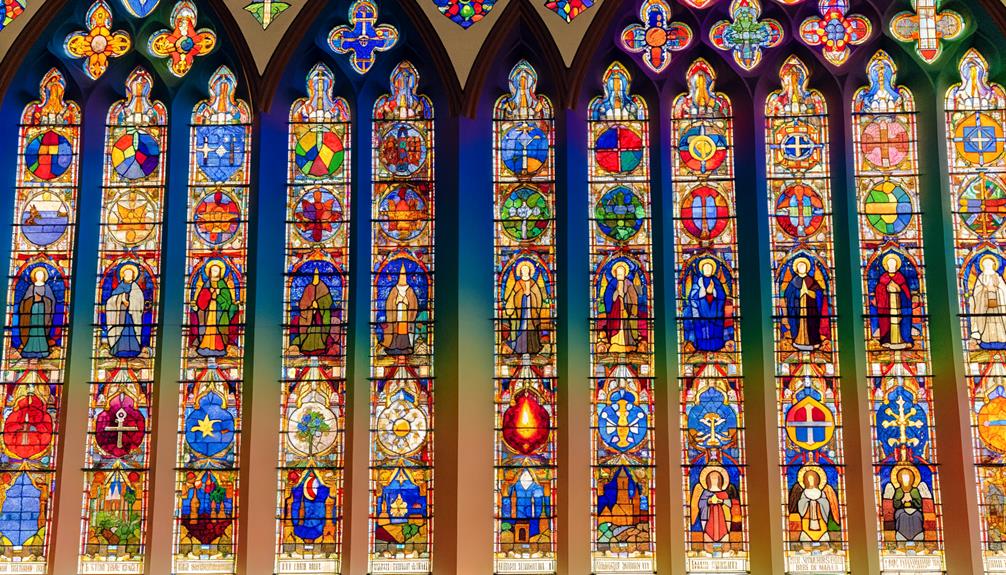Be the Light Bible Verse Meaning: Shining with Purpose
The phrase “Be the light” from Matthew 5:14-16 highlights Jesus’ exhortation for His followers to embody and radiate divine truth, purity, and moral integrity in a world fraught with spiritual darkness. In biblical literature, light symbolizes divine presence, guidance, and revelation, demanding an outward manifestation of inward transformation.
Historically, this message offered hope and a radical departure from the prevailing norms of first-century Judea under Roman rule. By understanding the biblical symbolism of light and its manifold implications across denominations, one can explore how it informs personal piety and public witness, making it a pivotal theological motif.

Be the Light Bible Verse Meaning: Spiritual Guidance and Purpose
| Aspect | Details |
|---|---|
| Bible Verse | Matthew 5:14-16 |
| Full Verse | “You are the light of the world. A city set on a hill cannot be hidden.” (Matthew 5:14) |
| Biblical Context | Part of Jesus’ Sermon on the Mount, teaching about the role of believers |
| Literal Meaning | Believers are called to be visible examples of goodness and truth |
| Spiritual Meaning | Encourages living in a way that reflects God’s love, grace, and righteousness |
| Moral Reflection | Inspires integrity, kindness, and compassion in daily actions |
| Symbolic Interpretation | Light symbolizes hope, truth, purity, and divine guidance |
| Connection to Faith | Emphasizes spreading the Gospel and being a positive influence in the world |
| Application in Life | Calls for acts of kindness, leadership, and standing firm in moral values |
| Philosophical Insight | Highlights the power of personal influence and responsibility in shaping communities |
| Modern Application | Encourages authenticity, social responsibility, and uplifting others through actions and words |
| Related Verses | John 8:12 (Jesus as the Light of the World), Philippians 2:15 (Shining as lights in the world) |
Scriptural Origins

The phrase ‘Be the light‘ finds its scriptural origins in the teachings of Jesus, particularly within the context of the Sermon on the Mount in the Gospel of Matthew. Specifically, Matthew 5:14-16 portrays Jesus exhorting his followers to be ‘the light of the world.’
This imperative underscores a theological and moral imperative for believers to illuminate their surroundings through righteous living and good deeds. The metaphor of light, frequently employed in biblical literature, symbolizes truth, purity, and divine presence. In this context, the Hanukkah significance in scripture highlights the importance of maintaining one’s faith and traditions amidst adversity, reflecting the enduring light of hope and resilience. As believers strive to embody this light, they not only inspire others but also create a ripple effect of positivity in their communities. Ultimately, living out these values reinforces the belief that every individual has the capacity to contribute to a brighter and more just world.
Consequently, Jesus’ commandment to ‘let your light shine before others’ is not merely an ethical directive but a profound theological statement. It calls for an outward manifestation of inward transformation, linking personal piety with public witness.
Historical Context

Understanding the historical context of Jesus’ exhortation to ‘be the light’ involves examining the sociopolitical and religious milieu of first-century Judea. This period was marked by:
- Roman Occupation: Judea was under Roman rule, creating an environment of political tension and social unrest.
- Jewish Religious Practices: The Jewish community adhered strictly to Mosaic Law, with a strong emphasis on ritual purity and adherence to the Torah.
In this context, Jesus’ call to ‘be the light’ served as a radical yet hopeful directive, urging his followers to embody goodness, truth, and divine wisdom amidst pervasive darkness and oppression.
Interpretations by Denomination

Different Christian denominations offer varied interpretations of Jesus’ exhortation to ‘be the light,’ reflecting their unique theological frameworks and doctrinal emphases.
For instance, Roman Catholicism often interprets this directive through the lens of sacramental living and social justice, emphasizing acts of mercy as manifestations of divine light.
Evangelical traditions, on the other hand, frequently focus on personal evangelism and the transformative power of individual witness.
Mainline Protestant denominations might stress communal aspects, interpreting ‘light’ as collective action towards social reform and inclusivity.
Eastern Orthodox Christianity views ‘being the light’ as participating in the divine energies through ascetic practices and liturgical worship, aiming for theosis.
Each interpretation enriches the understanding of this biblical metaphor within its respective context.
Symbolism of Light

Rooted deeply in biblical literature, the concept of light serves as a multifaceted symbol representing divine presence, truth, and moral purity. This symbolism encapsulates several key theological ideas:
- Divine Presence: Light often signifies God’s presence, illuminating the path of believers and dispelling darkness.
- Truth: Light metaphorically reveals truth, distinguishing it from the deceit of darkness.
Exegetically, light serves as a powerful image, underscoring the divine-human relationship and the moral imperatives of faith.
Light in the Old Testament

Throughout the Old Covenant, light functions as a critical symbol of divine intervention, guidance, and covenantal promises, manifesting in various narratives and prophetic literature.
From the creation narrative in Genesis, where God declares, ‘Let there be light’ (Genesis 1:3), to the guiding pillar of fire in Exodus, light signifies God’s presence and guidance.
The Psalms frequently evoke light as a metaphor for divine wisdom and protection, as illustrated in Psalm 119:105, ‘Your word is a lamp to my feet and a light to my path.’
Prophetic texts, such as Isaiah 60:1, envision light as a harbinger of salvation and divine glory.
Consequently, light in the Old Scriptures encapsulates a multifaceted symbol of God’s interaction with humanity.
Light in the New Testament

In the New Covenant, light continues to serve as a profound emblem of divine revelation, grace, and the transformative power of Jesus Christ. The New Scripture frequently employs light as a metaphor to elucidate critical aspects of Christian theology.
Divine Revelation: In John 1:9, Jesus is identified as ‘the true light’ that brings enlightenment to humanity, revealing God’s nature.
Grace and Salvation: Ephesians 5:8 urges believers to ‘walk as children of light,’ reflecting their transformation through Christ’s redemptive work.
Guidance and Truth: In Matthew 5:14-16, Jesus calls His followers ‘the light of the world,’ emphasizing their role in guiding others to truth.
These instances underscore light’s thematic significance, illustrating its multifaceted role in conveying spiritual truths.
Practical Applications

Building upon the theological significance of light in the New Covenant, it is imperative to explore how these scriptural metaphors translate into tangible actions and behaviors for contemporary Christians.
Practically, ‘being the light’ necessitates embodying virtues such as compassion, integrity, and humility, reflecting Christ’s character in daily interactions. This involves active engagement in community service, promoting social justice, and offering moral support to those in distress.
Additionally, it requires Christians to foster environments of truth and transparency, countering deception and moral ambiguity. By integrating these principles into their professional and personal lives, believers not only adhere to biblical teachings but also illuminate pathways for others to encounter divine grace and truth, thereby fulfilling their spiritual mandate.
Personal Stories

Examining personal narratives reveals how embodying the ‘Be the Light‘ ethos leads to transformative life changes, aids in overcoming personal struggles, and inspires acts of kindness.
These stories serve as empirical evidence of the verse’s practical influence on individual lives.
Understanding these accounts allows for a deeper comprehension of the verse’s capacity to foster resilience and compassion within communities.
Inspirational Life Changes
Countless individuals have experienced profound transformations in their lives by embracing the biblical exhortation to ‘be the light,’ finding it to be a guiding principle that illuminates their paths and fosters personal growth. This scriptural mandate has led to significant inspirational life changes, evidenced through various personal narratives.
Significantly, these stories often highlight:
- Enhanced interpersonal relationships: Acting as a light encourages kindness, thereby strengthening bonds.
- Increased community involvement: The drive to ‘be the light’ often translates into active participation in community service and outreach.
Such testimonies underscore the profound impact of applying this verse, fostering holistic development and societal contribution.
Overcoming Personal Struggles
In addition to fostering inspirational life changes, the exhortation to ‘be the light‘ has played a pivotal role in helping individuals overcome personal struggles, as evidenced through a myriad of compelling personal stories.
This biblical mandate serves not merely as an abstract ideal but as a tangible beacon of hope and resilience.
For instance, individuals grappling with addiction have found solace and strength in embodying the ‘light,’ transforming their lives through renewed purpose and spiritual fortitude.
Similarly, those experiencing profound grief report that the call to ‘be the light’ provides a framework for channeling their pain into acts of service and compassion, thereby mitigating their suffering.
Therefore, ‘being the light’ functions as a practical theology for overcoming adversity.
Acts of Kindness
Numerous accounts illustrate how the directive to ‘be the light’ manifests through acts of kindness, offering profound insights into its transformative impact.
These anecdotes elucidate the practical application of biblical teachings, shedding light on the potent influence of seemingly small gestures.
For instance:
- Community Support: Volunteering at local shelters provides immediate relief and fosters a sense of belonging among the marginalized.
- Mentorship: Guiding youths through mentorship programs not only aids their personal development but also strengthens communal bonds.
These examples underscore the biblical principle that kindness serves as a beacon, illuminating pathways for others and reinforcing communal harmony.
Inspirational Quotes

Inspirational quotes from the Bible serve as profound reflections on the human condition, often illuminating the path toward spiritual enlightenment and moral rectitude.
Verses such as Matthew 5:16, ‘Let your light so shine before men, that they may see your good works and glorify your Father in heaven,’ encapsulate the essence of living a life that uplifts others and honors divine principles.
These passages are not mere aphorisms but deeply rooted exhortations that challenge believers to transcend selfishness and embody virtue.
By meditating on these scriptural inspirations, individuals gain not only solace but also a compelling call to action, fostering a community grounded in faith and shared ethical commitments.
Consequently, biblical quotes serve as both guideposts and catalysts for transformative living.
Conclusion
The concept of being the light, rooted in both Old and New scriptures, has been interpreted diversely across denominations, symbolizing divine guidance, purity, and moral integrity.
Historical and contextual analyses reveal a profound theological richness that transcends mere metaphor.
Practical applications and personal declarations underscore its timeless relevance.
Truly, the exhortation to ‘be the light’ calls believers to an almost celestial standard of moral and spiritual illumination, beckoning humanity toward an unparalleled domain of divine aspiration.






